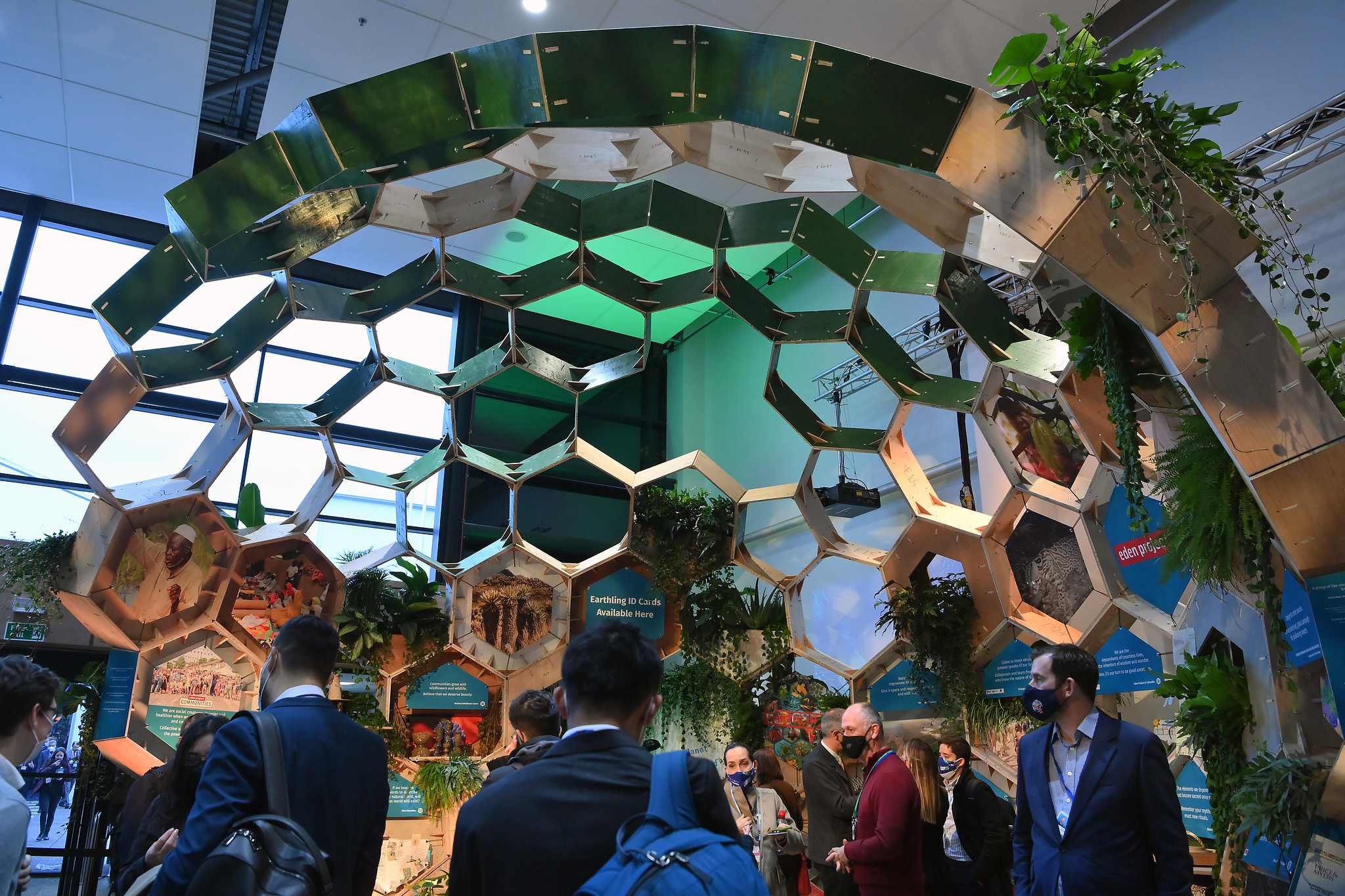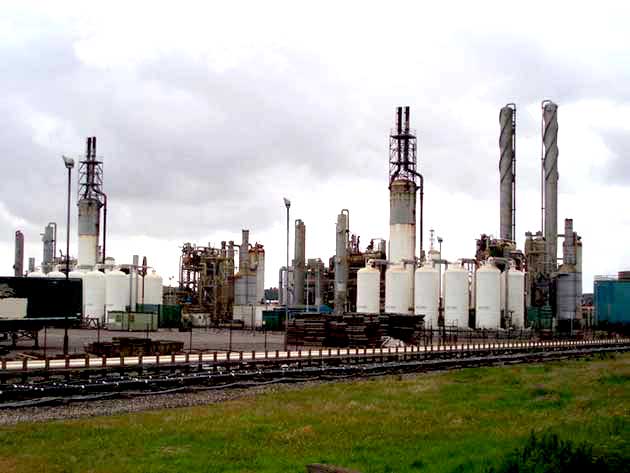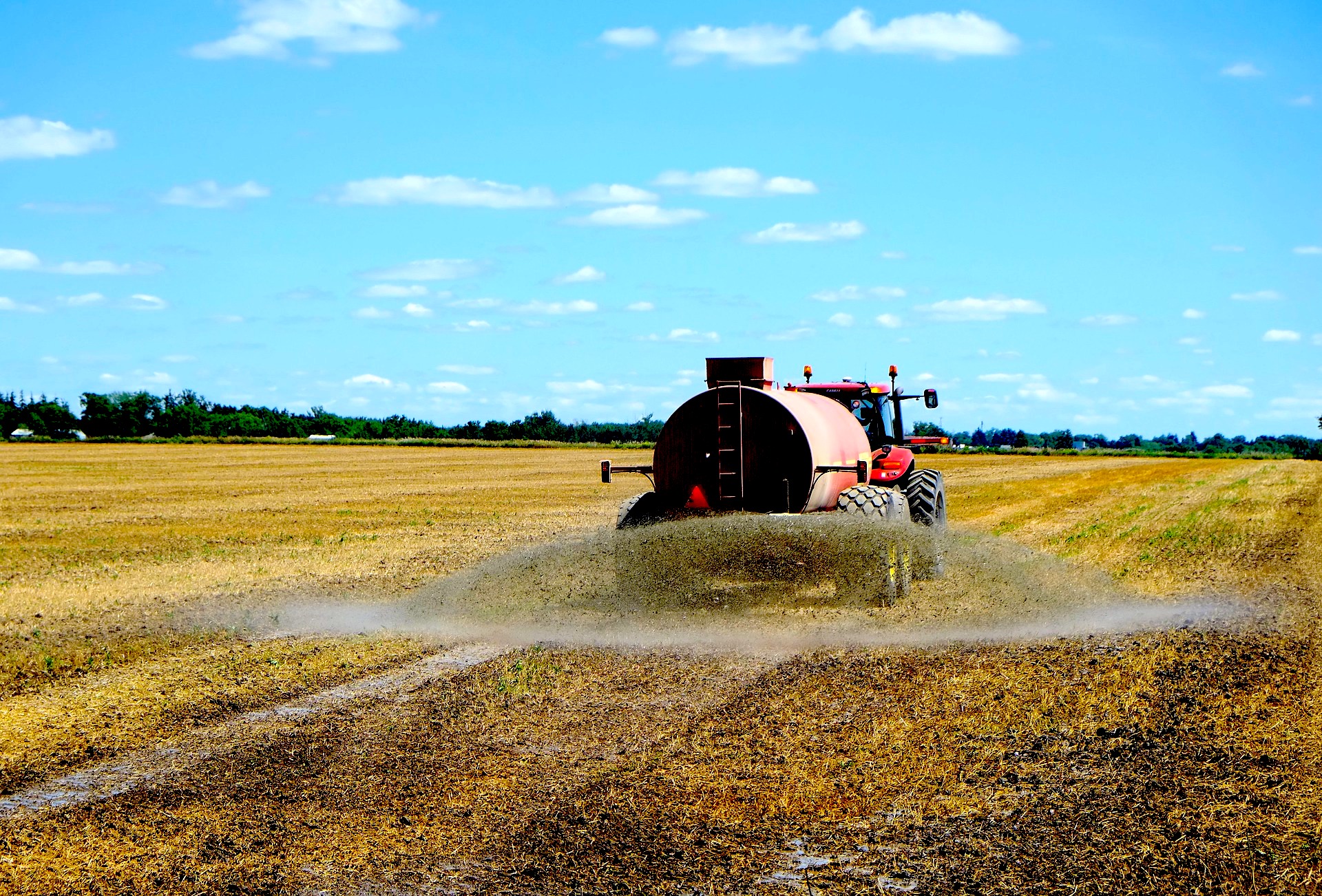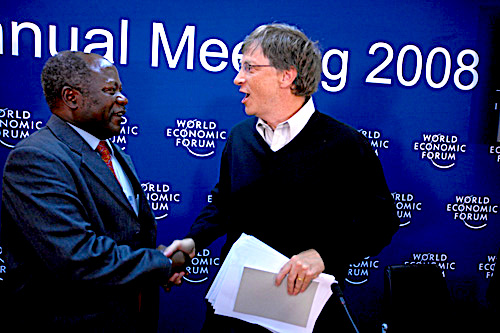It’s just plain wrong to say the only way to grow food is with synthetic fertilizers, writes Timothy A. Wise.

Exhibit at the COP26 climate conference in Glasgow in November. (IAEA Imagebank, Flickr, CC BY 2.0)
By Timothy A. Wise
Inter Press Service
 As world leaders wrap up the U.N. Climate Summit in Glasgow, new scientific research shows that there is still a great deal of magical thinking about the contribution of fertilizer to global warming.
As world leaders wrap up the U.N. Climate Summit in Glasgow, new scientific research shows that there is still a great deal of magical thinking about the contribution of fertilizer to global warming.
Philanthropist Bill Gates fed the retreat from science in his book How to Avoid a Climate Disaster earlier this year. “To me fertilizer is magical,” he confesses, nitrogen fertilizer in particular. Under a photo of a beaming Gates in a Yara fertilizer distribution warehouse in Tanzania, he admits though that “to grow crops, you want tons of nitrogen – way more than you would ever find in a natural setting [sic]…. But nitrogen makes climate change much worse.”
That last part, at least, is true, and new research suggests that the climate impacts of excessive use of nitrogen fertilizers is much worse than previously estimated. Researchers estimate that the N-fertilizer supply chain is contributing more than six times the greenhouse gases (GHGs) produced by the entire commercial aviation sector.
Nitrogen: A Growing Problem

Nitrogen fertilizer plant. (CC 2.0)
By all accounts, food and agriculture are barely on the agenda of the U.N. climate summit, even though food systems contribute about one-third of greenhouse gases. Direct emissions from food production account for about one-third of that, with the principal source being livestock, mostly methane and manure emissions.
But about 10 percent of direct emissions from come from synthetic nitrogen fertilizer applied to crops. Only a portion of the applied fertilizer is absorbed by plants. Some is turned into nitrous oxide by soil micro-organisms. Some leaches off the soil or volatilizes into gas when it is applied. The cumulative effect is the release of nitrous oxide, a GHG 265 times more potent than carbon dioxide.
Three scientists working with Greenpeace, the Institute for Agriculture and Trade Policy, and GRAIN have carried out the first comprehensive lifecycle analysis of N fertilizer emissions. They used improved data on direct field emissions and incorporated emissions from the manufacture and transportation of N fertilizers. Manufacturing, which relies heavily on natural gas, accounts for 35 percent of total N fertilizer GHGs.

(Pixabay)
The new estimates, which are preliminary as they undergo peer review, are 20 percent higher than those previously used by the United Nations.
Not surprisingly, the largest emitters are the largest agricultural producers: China, India, North America, and Europe. On a per capita basis, though, the largest emitters are the big agricultural exporters: United States, Canada, Brazil, Argentina, Australia, New Zealand, and Europe.
Taking Africa in Wrong Direction

Jan. 25, 2008: Bill Gates and Namanga Ngongi, then president of the Alliance for a Green Revolution in Africa. (World Economic Forum, Flickr, CC BY-NC-SA 2.0)
Africa is still not a large fertilizer user, with application rates low – about 15 kg/ha – but rising rapidly with the recent Green Revolution campaigns.
While Gates essentially dismisses the climate impacts from fertilizer as a necessary evil to achieve the greater good of food security, evidence is growing that the Green Revolution approach is failing on its own terms. My research showed that in the 13 focus countries of the Gates-funded Alliance for a Green Revolution in Africa, or AGRA, yields were not growing significantly and the number of undernourished people has increased 31 percent.
The greater good promised by AGRA has not been very good.
According to the new fertilizer research, AGRA is taking Africa in the wrong direction. Globally, the use of nitrogen fertilizer is projected to grow between 50 percent and 138 percent by 2050. Africa is projected to see at least a 300 percent increase in the next 30 years. It will be far greater if Gates has his way.
The climate implications of that development path are worrisome. A 300 percent increase means 2.7 million tonnes (Mt) more of N fertilizer in Africa. With field emissions estimated at 2.65 tonnes of GHGs per tonne of nitrogen and another 4.35 tonnes from production and transportation, total emissions are more like 7 tonnes of GHGs per tonne of N fertilizer.
By 2050, a 300 percent increase in Africa’s fertilizer use would mean adding about 19 Mt of GHGs per year more than it emits now. Because GHGs accumulate in the atmosphere and nitrous oxide persists for more than 100 years, Africa will have contributed an additional 284 Mt of GHGs by 2050 if fertilizer use increases 300 percent.
If Gates and AGRA get their way and Africa approaches current global averages of 137 kg/ha of N fertilizer, Africa would contribute 800 percent more, an additional 50 Mt in 2050, equivalent to the emissions from deforesting half a million hectares of Amazon rainforest (about 1.2 million acres). Cumulative GHGs would be 750 Mt by 2050.
That is an amount nearly equal to the annual emissions of the entire commercial aviation sector.
‘Climate-Stupid Agriculture’
Gates is just plain wrong when he says the only way to grow food is with synthetic fertilizers. Crops need nitrogen and in many areas they can get most or all of what they need from improved agro-ecological farming. Globally, with improved nutrient management practices there could be a 48 percent reduction in synthetic fertilizer use with no reduction in cereal yields, according to one article in Nature.
The scientists who authored the new report make three recommendations to reduce greenhouse gases associated with N fertilizer use. All call into question Gates’ Green Revolution model for Africa:
- Select a model of agriculture that does not depend on synthetic fertilizers; intercropping with nitrogen-fixing crops has been shown to increase yields and improve soils.
• Reintegrate livestock into crop farming so more of the nutrients in manure are returned to the land; less than half are now.
• Limit the growth of industrial livestock production and consumption. Three-quarters of N fertilizer worldwide is used to produce livestock feed.
The science is clear: African farmers are right when they call the Green Revolution “climate-stupid agriculture.”
Timothy A. Wise is a senior adviser at IATP, where his work focuses on agribusiness, family farmers and the future of food, based on his recent book, Eating Tomorrow: Agribusiness, Family Farmers, and the Battle for the Future of Food (The New Press).
This article is from Inter Press Service
The views expressed are solely those of the author and may or may not reflect those of Consortium News.

Turfing subsistence farmers off the land so they are forced to work for wages to feed themselves and their families, and using the newly cleared land to grow crops for export as efficiently as possible; this is a story we’ve heard before, same as it ever was. Historical materialism continues, and the solution remains the same.
another dirty trick played on farmers is the GMO slight of hand.
For 10’s of thousands of years farmers sustained themselves by harvesting crops and gathering the seeds from those crops to plant the following year.
Monsanto et al came along with a faux argument, bought by an ignorant corrupted Congress, why their PATENTED seeds with built in weed killer would be better. Darwin would have told them that this was folly and the weeds would evolve to be bigger, stronger and resist the genetically modified seeds that had no nutritional benefits but were being used to take from the farmer access to his own seeds from his plant. The goal apparently was to bankrupt farmers – at least that was the outcome.
I don’t know why many people look at all of those computer geeks as wise philosophers who, just because they can write computer code, means that they have all of the answers to all of humanity’s problems that have nothing to do with writing computer code. Like, wtf does a guy whose house has 23 bathrooms know about the life of a poor African? He doesn’t know a damn thing about how the rest of us live. Or how we would like to live. All of those damn rich technocrats who are bored need to just leave us alone and go enjoy their money without interfering with every little detail of our day to day lives.
You hit the nail on the head here, Aaron:)
If there were a modesty pill and an honesty pill and they were prescribed for the people whose $billions convinced them they KNOW
“the answers to all of humanity’s problems” as you say, we’d be one step ahead in this troubled world.
Thanks for this Timothy Wise and CN! It’s lucid enough, and I’ll be stoked to read it over again more carefully. But now, some knee jerk reactions. I don’t know much about what went on at COP26, but I’m wondering if the participants really grasped what SARS-CoV-2 is telling us (telling us inadvertently). Telling us something about how in this paradigm we’re not understanding living things too well. At least Gates isn’t. Need to move on to something more Schweitzer-ian. There were also those clear skies in India where folks could see the mountains.
Personally I don’t like thinking about kids that like milk not being able to afford it. I’d say cut the new ICBMs and hypersonic research and the plane parts for SA and all the MICIMATT pork, stop fracking…do everything Yves Smith, Varoufakis, Hudson, and Squad recommend…to offset enough cows! The things I read Leche Con Dignidad listing…the problems…brought me closer to the reality of the era I live in. Maybe they’ve had some victories; dairymen should not be driven like slaves.
Anyway, when we go into this science it’s heading us (get along little doggies) inexorably to Rob Wallace’s topics. The whole field is broad and complex. I’m glad about the things he’s been able to get across. But as we go into it, a debate shouldn’t be missing in my opinion between Wallace and Nicholas Wade. Actually there are a whole slew of guys + gals I’d like to see him debate. Keep it measured, not so fast it’s over everyone’s heads. Define terms. We all need to learn.
Timothy Wise wrote a typical “green commentary”. There are no numbers associated with “green alternative” (or organic alternative). What would be the drop in crops that are grown with nitrogen fertilizers? How it would impact food prices, food balance in the world?
My guess and pencil estimate is that one can alternate legume crops and “green fertilizers” with cereals, halving the production of cereals. That may be a plausible prescription for Europe and North America, halving meat consumption and get proteins from legumes instead.
I am not so sure about East Asia and parts of South Asia that rely on rice. They would half rice production and what they would get instead? Can they make meat for legumes switch? And some regions rely on food import as it is — doubling cereal prices would drive hundreds of millions to starvation, or “food insecurity”.
First impression is that Wise proposes a massive change in eating habits that may be potentially healthy but unpopular. But halving food intake in, say, Bangladesh, does not seem healthy at all. As the proponent, Wise should offer some analysis of his own, preferably using a more reliable approach than my guesswork and pencil.
Then there is the case of Africa. There exists high yield crops there that do not rely on fertilizers. But there are also regions with protein deficiency: without fertilizers, crops with more proteins have much lower yield.
As an aside, using highly fertilized corn to produce alcohol seems to be more perverse than I knew before I read this article. But this program had noble green motivations — plus some agribusiness beneficiaries. Advocacy of that program is exhibit I of “green commentary” that is partly unrealistic and partly business agenda.
Yes, thank you, Mr Wise.
I spoke to a gardening expert who said that the use of chemical fertilizers is a serious pollutant in our watersheds. Based on soil science, nutrient balance in the soil develops naturally with compost. Organic fertilizer and compost teas help. Chemical nitrogen fertilizer does nothing for the soil but rather something TO the soil….hmmmm……
Bill Gates has made so much money, apparently, that it’s gone to his head – he thinks he has the expertise to craft policy and he knows he has the money to push his weight around when decisions are made – too bad since he’s in over his head on this subject and others he’s prone to pushing erroneous information that fits in with his flawed views and his predisposition to thinking big, too big on stuff that impacts our ecosystem. But like too many other bored billionaires who want to rule the world.
There’s just too much influence from wealthy people who know nothing but made a couple bucks and decide they know.
Their money’s gone to their swelled heads.
Yes. Nitrate fertilizers are salt-based. Eventually, continual use of them deplete the soil of microbes, rendering the soil not only lifeless, but fragile. The science supporting this is well known. In a healthy soil, it is the microbes that provide a plant with nutrients as they feed on organic and inorganic matter–and each other. Much of this feeding frenzy occurs within 2mm of the roots. Crudely put–the plant kind of ‘sweats’, and the bacteria feed on that, each other, and the fungi feed on them as well as minerals. The plant absorbs much of the residue of that activity through the roots.
A problem is: What to do with impoverished soil depleted of microbes? The nitrate fertilizer is the monkey on the back. Without that shot-in-the-arm, the next crop will be poor, and folks could be hungry. With good aggressive soil management, it can take 3-5 years to ‘organisize’ a soil to approach yield levels formerly achieved with nitrates. The good news is that the quality of the product is far superior when grown in organic soils rich in microbes.